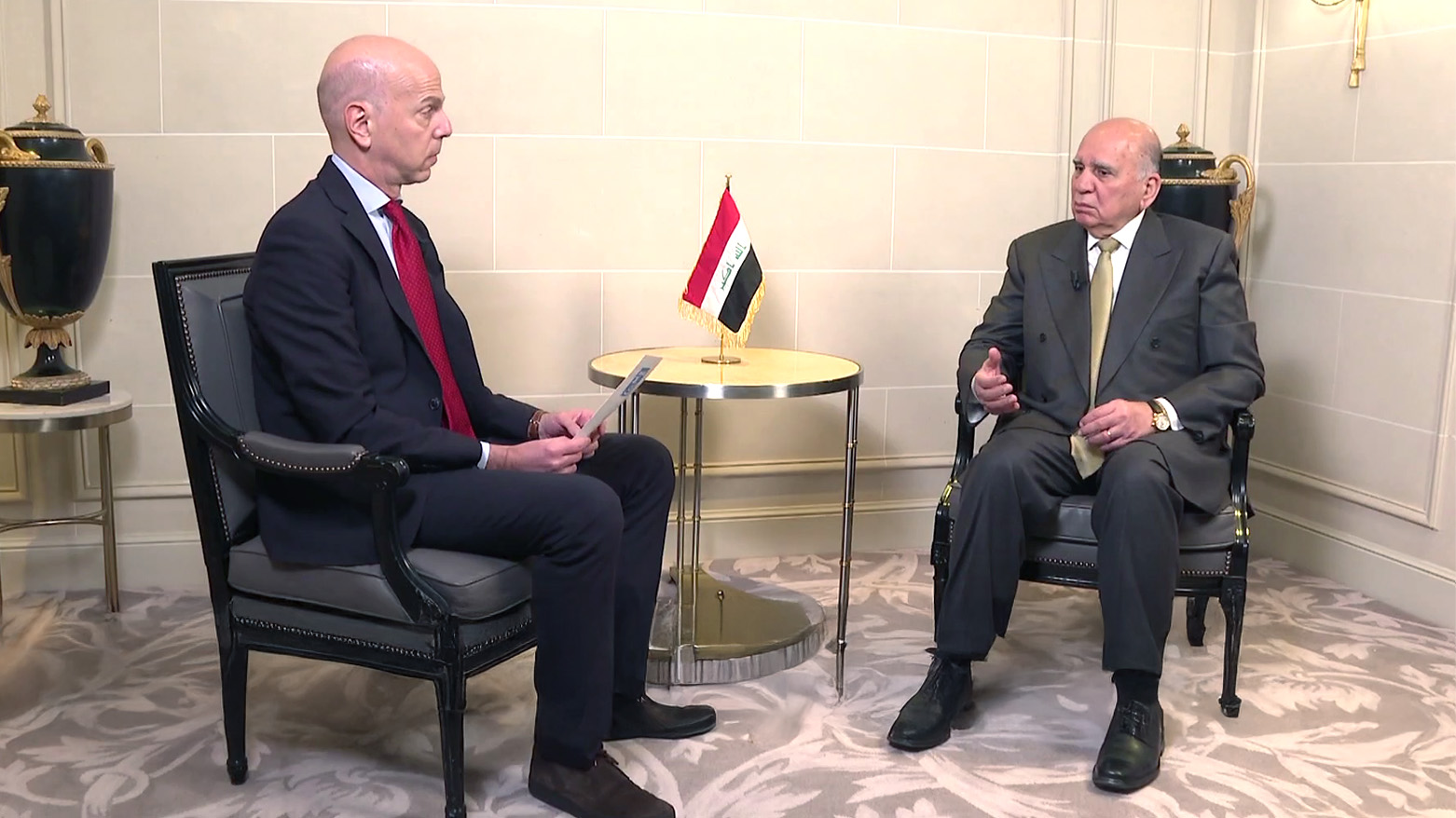Iraqi FM Discusses Syria, Coalition Forces in France24 Interview
He indicated further discussions with the U.S., saying despite the original understanding, "There is a new reality in the Middle East, this is a fact."

ERBIL (Kurdistan24) – In an exclusive interview with France24’s flagship show TÊTE À TÊTE, Iraqi Foreign Minister and Vice Prime Minister Fuad Hussein addressed critical issues including Iraq’s engagement with Syria, the role of coalition forces, and ongoing regional tensions.
The discussion also covered the situation in Gaza, Iraq’s energy dependency, and relations with the U.S.
Syria and the Future of Regional Stability
Hussein confirmed that Iraq remains in active discussions with Syria’s new leadership. “We are in good discussion with the new administration in Damascus and we were from the beginning in contact with the leaders,” he stated, revealing that Syria’s foreign minister has been invited to visit Baghdad on February 20 to continue diplomatic talks.
The Iraqi government is also set to host the Arab League summit in May, where Hussein confirmed that all Arab leaders, including Syria’s Ahmed al-Sharaa, would be invited.
However, when questioned about al-Sharaa’s past involvement in conflicts, Hussein acknowledged that he had fought in Iraq but stated he was unaware of any arrest warrant against him.
Regarding the security situation, Hussein expressed concern about the resurgence of ISIS along the Iraq-Syria border.
He stated that ISIS terrorists remain active inside Syria saying, "there are ISIS terrorists on the border, on the other side of the border, inside Syria and they are very much active nowadays,” he stated.
He emphasized that Iraq is engaging with Damascus, regional partners, and the international coalition to address this persistent security risk.
Hussein also highlighted the issue of detained ISIS members in Syria.
“It is not only about Al-Hol; we have got 26 prisons and under the control of Syrian Democratic Forces and these prisons are the prisoners they are all ISIS leaders and ISIS fighters so we are talking about 10 to 12,000 prisoners all of them they are ISIS,” he said.
He also highlighted that most of the prisoners are ISIS leaders and called the situation a “ticking time bomb.”
He warned that if these prisoners were freed, they could cross into Iraq and restart insurgent activities.
Iraq has already begun repatriating families from the al-Hol camp, and he reiterated the need for continued collaboration with Syria’s new leadership and the SDF.
Coalition Forces in Iraq: Future Uncertain Amid Regional Turmoil
Addressing the presence of U.S.-led coalition forces in Iraq, Hussein noted that the current agreement stipulates their withdrawal by September 2026.
However, he acknowledged that shifting dynamics in the Middle East, including conflicts in Lebanon, Syria, and Gaza, have introduced new uncertainties.
He indicated further discussions with the U.S., saying despite the original understanding, "There is a new reality in the Middle East, this is a fact."
When pressed on whether Iraq would prefer coalition forces to stay, Hussein avoided giving a definitive answer but pointed to the broader regional instability.
“It is not about what I like or don’t like—it’s about the new reality in the Middle East,” he remarked.
Gaza, U.S. Policies, and Regional Tensions
Hussein strongly rejected the idea of displacing Palestinians from Gaza, referring to former U.S. President Donald Trump’s suggestion that America should “own” Gaza and relocate its inhabitants to Jordan, Egypt, or elsewhere.
“We are with the right of self-determination of the Palestinian people. And that means the Palestinian people will choose their future and their rights. So to displace them, to transfer the Palestinian people from their own land to somewhere else, I think, is not acceptable,” he affirmed.
He also confirmed Iraq’s participation in an emergency summit in Egypt on February 27, where Arab leaders will present a unified stance on the issue.
On concerns of a second Nakba, Hussein warned that if large-scale displacement occurred, it would fundamentally alter the Palestinian cause.
“It would shift the Palestinian question from a political struggle to a refugee crisis,” he said, stressing that such a development would destabilize the entire region.
Iraq’s Energy Challenges and U.S. Sanctions on Iran
Another pressing issue was Iraq’s energy dependency on Iranian gas. Hussein acknowledged that the U.S. waiver allowing Iraq to import Iranian gas had ended under a new executive order issued by Trump on February 4.
“This is indeed a big problem [...] we are depending heavily on Iranian gas for about 35 to 40 percent of our electricity,” he admitted, revealing that Iraq is now in discussions with multiple gas-producing countries to secure alternative supplies.
Hussein also noted that Iran has independently reduced its gas exports to Iraq due to domestic energy shortages, adding another layer of complexity to the crisis.
“We are facing a new dilemma, which has to do with finding gas for our power station,” he said.
Iran’s Influence and Iraq’s Armed Groups
When questioned about pro-Iranian militias in Iraq, Hussein emphasized that the issue is primarily an Iraqi concern. However, he acknowledged that serious discussions are underway about integrating these groups into the official security framework.
“We cannot have various groups, especially groups outside, functioning outside, let's say, the government. So it must be within the framework of the government and the framework of the armed forces,” he insisted.
On potential U.S. or Israeli strikes against these militias in response to tensions in Gaza, Hussein dismissed the idea, stating that Iraq has a strategic dialogue with Washington and has received no indication of such plans.
“We hope that they are not going to do that,” he added.
Fuad Hussein’s interview underscored Iraq’s complex position in regional geopolitics.
From navigating shifting alliances in Syria to addressing the ongoing threat of ISIS, managing tensions between armed factions, and dealing with energy shortages, Iraq remains at the center of multiple security and political challenges.
As discussions with the U.S. and regional partners continue, Iraq’s foreign policy decisions in the coming months will be critical in shaping its stability and future role in the Middle East.